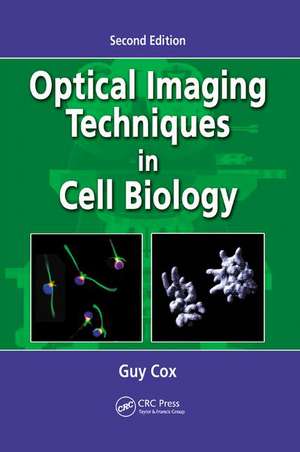Optical Imaging Techniques in Cell Biology
Autor Guy Coxen Limba Engleză Paperback – 23 oct 2017
Expanded with a new chapter and 40 new figures, the second edition has been updated to cover the latest developments in optical imaging techniques. Explanations throughout are accurate, detailed, but as far as possible non-mathematical. This edition includes appendices with useful practical protocols, references, and suggestions for further reading. Color figures are integrated throughout.
Preț: 488.97 lei
Preț vechi: 575.26 lei
-15% Nou
Puncte Express: 733
Preț estimativ în valută:
93.57€ • 100.05$ • 78.01£
93.57€ • 100.05$ • 78.01£
Carte tipărită la comandă
Livrare economică 17 aprilie-01 mai
Preluare comenzi: 021 569.72.76
Specificații
ISBN-13: 9781138199408
ISBN-10: 1138199400
Pagini: 316
Ilustrații: 248
Dimensiuni: 156 x 234 x 17 mm
Greutate: 0.45 kg
Ediția:2nd edition
Editura: CRC Press
Colecția CRC Press
Locul publicării:Boca Raton, United States
ISBN-10: 1138199400
Pagini: 316
Ilustrații: 248
Dimensiuni: 156 x 234 x 17 mm
Greutate: 0.45 kg
Ediția:2nd edition
Editura: CRC Press
Colecția CRC Press
Locul publicării:Boca Raton, United States
Cuprins
The Light Microscope. Optical Contrasting Techniques. Fluorescence and Fluorescence Microscopy. Image Capture. The Confocal Microscope. The Digital Image. Aberrations and Their Consequences. Nonlinear Microscopy. High-Speed Confocal Microscopy. Deconvolution and Image Processing. Three-Dimensional Imaging: Stereoscopy and Reconstruction. Green Fluorescent Protein. Fluorescent Staining. Quantitative Fluorescence. Advanced Fluorescence Techniques: FLIM, FRET, and FCS. Evanescent Wave Microscopy. Beyond the Diffraction Limit. Appendix A: Microscope Care and Maintenance. Appendix B: Keeping Cells Alive under the Microscope. Appendix C: Antibody Labeling of Plant and Animal Cells: Tips and Sample Schedules. Appendix D: Image Processing with ImageJ.
Notă biografică
Guy Cox is a professor within the Electron Microscopy Unit at the University of Sydney, Australia.
Recenzii
Praise for the First Edition
“…represents an excellent resource for those wishing to gain a grounding in a broad range of optical techniques…written in a highly knowledgeable, enthusiastic and accessible manner…comprehensively covers virtually the entire field of microscopy. …a valuable addition to the bookshelf of many research laboratories…can quickly and easily provide a clear understanding of commonly used techniques and underlying concepts. Students, technicians, and researchers will find it useful whether they are intending to use the techniques, have been using the techniques for some time, or are merely curious to know more about what the techniques can offer the cell biologist.”
—Mark Prescott, Department of Biochemistry and Molecular Biology, Monash University, in Australian Biochemist, vol 38 no 3
“…represents an excellent resource for those wishing to gain a grounding in a broad range of optical techniques…written in a highly knowledgeable, enthusiastic and accessible manner…comprehensively covers virtually the entire field of microscopy. …a valuable addition to the bookshelf of many research laboratories…can quickly and easily provide a clear understanding of commonly used techniques and underlying concepts. Students, technicians, and researchers will find it useful whether they are intending to use the techniques, have been using the techniques for some time, or are merely curious to know more about what the techniques can offer the cell biologist.”
—Mark Prescott, Department of Biochemistry and Molecular Biology, Monash University, in Australian Biochemist, vol 38 no 3
Descriere
This reference on optical imaging techniques covers the field from the basics of the optical microscope to highly advanced techniques such as Förster resonant energy transfer (FRET) and fluorescence lifetime imaging microscopy (FLIM). Using a uniform style and format, it provides an understanding of the underlying principles, so readers can learn the benefits and limitations of each technique described. Topics covered include: optical contrasting techniques, fluorescence and fluorescence microscopes, three-dimensional imaging, the confocal microscope, nonlinear microscopy, advanced fluorescence techniques, and breaking the diffraction limit. Chapters include suggestions for further reading.
